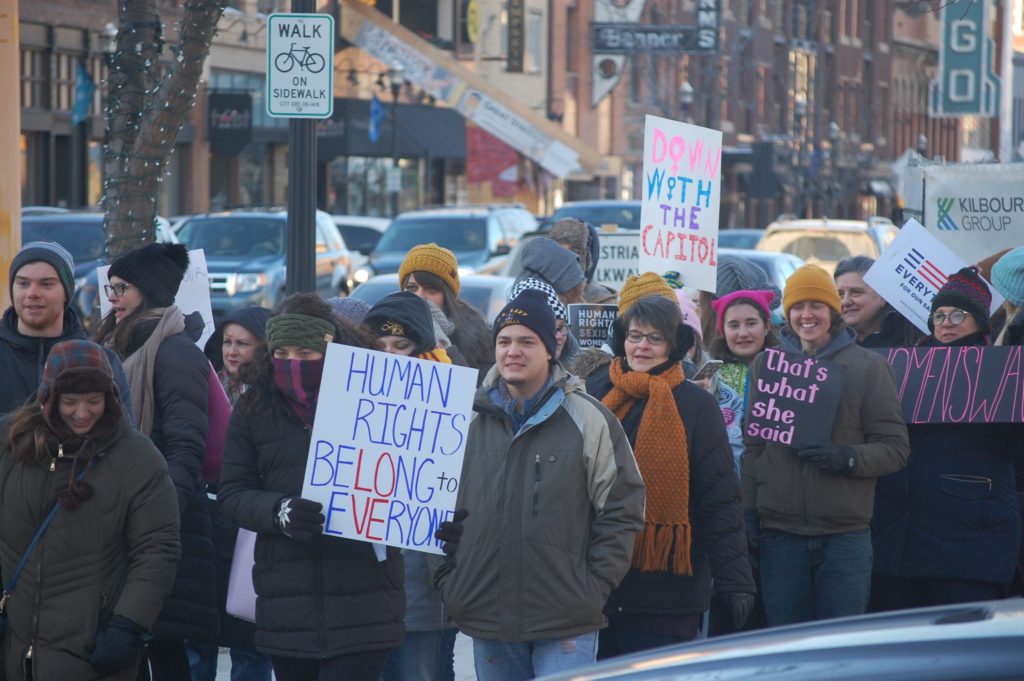Four NDSU students and professors share their reasons for protesting

People marched around downtown Fargo to showcase what they are fighting for.
Over 700 people, a part of different communities and genders, participated in the annual Fargo-Moorhead Women’s March Jan. 19. Each of which have their own beliefs and reasons for joining in on the protest. Among these marchers were North Dakota State professors and students who were not shy to the gathering, and four of which shared their reasoning for their fight.
Amanda Savitt, a graduate student working toward her Ph.D. in emergency management, not only participated in the local women’s march, but in 2017 she marched in Washington D.C.
“If you’re not saying anything, then you’re not doing anything”
Mary McCall
She was originally inspired by how upset she was by the 2016 presidential election. Savitt said she felt like she had to make herself seen as well as other women to “voice our opposition.” Through this, she has joined many groups to try and make a difference and become more aware of different rights. Savitt is now the secretary of the American Association of University Women Fargo Branch, and she also does work with Cass County Democrats and participates in some Red River Socialist Feminist meetings.
She explained how the election added onto the barriers women face because now there is a constant reminder that “this person who’s in charge of our country hates women.”
However, today she does not think of the march as a major form of activism, but an experience that brings the community together and shows that many people have the same values. “The feeling of solidarity and the experience of having everybody who believes in, not necessarily the exact same things, but has similar values in the same place,” Savitt said.
The women’s march represents many different rights and problems we face in the government today. For Savitt, she was concerned about health care, due to her diabetes. Once President Trump was elected, “My immediate response was, ‘How am I going to pay for insulin?’” Savitt explained.
She explained how women’s rights face a threat from the government, but she also thinks that women have been lucky that more rights haven’t been taken away yet.
Among those rights is the common controversy of reproductive rights. This issue inspires Jenika Rufer, graduate student in the clinical mental health counseling program, to keep fighting for her pro-choice beliefs.
“A woman shouldn’t have to have the government infringing on her body,” Rufer said. Rufer has shared her story through Planned Parenthood about the difficulty to get birth control. She did not have insurance, but through Planned Parenthood Title 10 funding she was able to get birth control. She said it is important for her to fight for those who cannot afford or do not have insurance for that care.
At this time, according to Rufer, people have become aware of women’s rights because they are at risk of being taken. Rufer explained how the march can start that fire in people and how it can be discouraging in a red state, but that if we gather as a community we can make our voices heard. “It’s a great way to have like-minded people come together and realize that they’re not alone in this fight,” Rufer said.
Mary McCall, assistant professor in the NDSU English department, explained that there are many issues that still need attention, like abortion, birth control, pay gaps, sexual assault, etc. These issues continue to need further attention and discussion with legislative support. McCall said she’s still hopeful to see more diversity in the legislation to make changes.
McCall grew up with a single mother in a middle-class family. Through that she was able to see the side effect of being a young mother because she had to watch her mother fight sexism in a male dominated career path. She sees her mother as a role model because of this.
McCall explained how the record number of women elected into Congress showed there has been progress, but that there is more to do, so “celebrate what changes we have started to see.”
The speakers during the rally consisted of a diverse group from members of the LGBTQ+ community to Indigenous women. McCall liked being able to showcase her support and become an ally for the communities represented. It was important to her to have a whole range of people to show diversity and have people learn more about local issues through the speakers.
One of the hosts from Indivisible F-M, a speaker and a professor of geosciences, Lydia Tackett, spoke about how inspiring marches are for people to become involved. “I was really inspired by the feeling of community growth,” Tackett shared. After her first women’s march in 2017, she joined the Indivisible group to try to become more involved with the issues.
“It’s not just for women; we want male allies to be there and to become aware”
Lydia Tackett
Tackett explained how national issues are better well known than ever before, but that local issues in the community are often overlooked and need to be heard. All of the speakers spoke about and showed the protestors the rights that need to be protected, like protection from discrimination in the communities of people of color, indigenous women, LGBTQ+, etc., which is one of the reasons why she felt so inspired by the community gathering.
Tackett explained how she wants people to become aware of the bias against women that they may not know they have. “I think women experience all kinds of microaggressions, and sometimes even if it’s not an overt discrimination, there are decisions that are made with regard to women that end up hurting their careers, and it’s bias that people may not know they have,” Tackett said.
